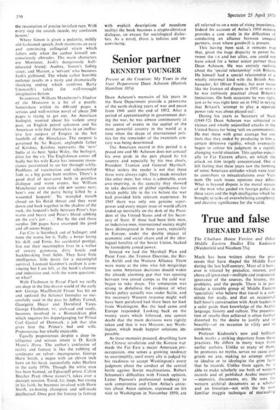Senior partner
KENNETH YOUNGER
Present at the Creation: My Years in the State Department Dean Acheson (Hamish Hamilton 105s)
Dean Acheson's memoirs of his years in the State Department provide a panorama of the earth-shaking years of war and peace from 1941 until the end of 1952. After a period of apprenticeship in government dur- ing the war, he was almost continuously at the centre of events in the capital of the most powerful country in the world at a time when the shape of international poli- tics for the remainder of the twentieth cen- tury was being determined.
The American record in this period is a proud one and Mr Acheson does not conceal his own pride in the part played by his country and especially by his two chiefs, President Truman and General Marshall. What strikes the reader is not that these three were always right. They made mistakes like other men; but what is admirable, even awe-inspiring, is the capacity they showed to take decisions of global significance for which public life in the us before the war had provided little relevant experience. In 1945 there was only one genuine super- power and every major issue of world affairs ended up inevitably on the desk of the Presi- dent of the United States and of his Secre- tary of State. If these had been little men, or indecisive men, international society might have disintegrated in these years, especially in Europe, under the double impact of economic and social chaos and of the ideo- logical hostility of the Soviet Union, backed by formidable armed power.
Instead we had the Marshall Plan and Point Four, the Truman Doctrine, the Ber- lin Airlift and the Western Alliance. There were many at the time who felt misgivings lest some American decisions should widen the already alarming ga-p that was opening between two armed camps as the cold war began to take shape. The temptation was strong to disbelieve the evidence of what Soviet policy actually was under Stalin, and the necessary Western response might well have been paralysed had there been no lead from Washington. But the lead came and Europe responded. Looking back on the twenty years which followed, one cannot doubt that the main decisions were rightly taken and that it was Moscow, not Wash- ington, which made happier solutions im- possible.
As these memoirs proceed, describing how the Chinese revolution and the Korean war made the Far East a major American pre- occupation, one senses a growing tendency to oversimplify, until every ally is judged by his readiness to accept Washington's every judgment about the conduct of the central battle against Soviet machinations. Robert Schuman's difficulties with French opinion, Lester Pearson's professional tendency to seek compromise and Clem Attlee's anxie- ties about Asian opinion, expressed on his visit to Washington in November 1950, are
all referred to on a note of rising impatience. Indeed the account of Attlee's 1950 mission provides a case study in the difficulties of conducting an alliance between unequal partners, even where goodwill is present.
This having been said, it remains true that, given the huge disparity in power be- tween the us and her allies, one could not have asked for a better senior partner than Dean Acheson. He was entirely realistic about the 'special relationship' with Britain; He himself had a special relationship of a wholly informal kind with the British Am- bassador, Sir Oliver Franks, but over issues like the Iranian oil dispute in 1951 or ANZL s he was ruthlessly practical about Britain's limitations. On both occasions he was right, just as he was right later on in 1962 in saying that Britain's 'attempt to play a separate power role was about played out'.
During his years as Secretary of State (1949-52) Dean Acheson was subjected to vicious and wholly unjustified attacks in the United States for being 'soft on communism'. He met these with great courage but one feels that they ended by producing in him a certain defensive rigidity, which eventually began to colour his judgment in a rapidly changing world situation. This applies especi- ally to Far Eastern affairs, on which the attack on him largely concentrated. One is left feeling that these years saw the forming of some American attitudes which were later to contribute to miscalculations over Viet- nam. On such issues opinions may differ. What is beyond dispute is the moral stature of the man who guided us foreign policy in these years and the high intelligence which he brought to tasks of overwhelming complexity and decisive significance for the world.






































 Previous page
Previous page